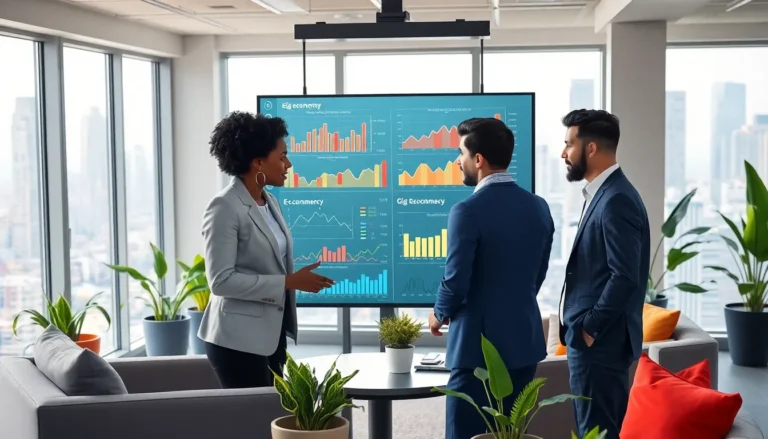In a world where the economy seems to change faster than a cat meme goes viral, understanding trending economics has never been more crucial. From inflation rates that could make your wallet weep to the latest buzz around cryptocurrencies that sound like something out of a sci-fi movie, staying informed is key.
Table of Contents
ToggleOverview Of Trending Economics
Trending economics shapes the landscape of modern finance and social dynamics. Inflation affects purchasing power, leading individuals to seek budget-friendly strategies to manage expenses. Changes in inflation rates create uncertainty, influencing consumer behavior and investment choices. Economists emphasize the importance of understanding inflation’s direct impact on savings and spending habits.
Cryptocurrencies have gained traction as alternative investment avenues, intriguing many with their potential for high returns. Innovations in blockchain technology facilitate peer-to-peer transactions, allowing users to bypass traditional banking systems. Several investors view cryptocurrencies as a hedge against inflation, appealing to those looking for options outside conventional assets.
Sustainability trends are now integral to economic discussions. Renewable energy sources and sustainable practices attract investments, underscoring a collective shift towards eco-conscious economics. This transition to green technologies reflects growing consumer demand for environmental awareness and corporate responsibility.
Global trade dynamics also play a vital role in trending economics. Supply chain disruptions during events like the COVID-19 pandemic reveal vulnerabilities in international commerce. Companies increasingly seek resilience through diversification of suppliers and local sourcing, adjusting to improve reliability.
Labor markets shift in response to economic pressures and innovation. Remote work opportunities expand as businesses adapt to new operational models. Job seekers increasingly prioritize flexibility, forcing companies to innovate their hiring practices and workplace environments.
Key Factors Influencing Trending Economics

Understanding key factors influencing trending economics proves crucial for navigating today’s financial landscape. As economic conditions shift, several elements contribute significantly.
Globalization and Trade Dynamics
Globalization continues to reshape trade dynamics across nations. Increased interdependence among countries facilitates the flow of goods and services, driving economic growth. Supply chain disruptions highlighted vulnerabilities in global networks, prompting companies to reevaluate supplier strategies. Shifting trade policies also influence market accessibility, impacting tariffs and regulations. Additionally, emerging markets offer new opportunities, urging nations to adapt their economic practices. Businesses increasingly prioritize diversification to mitigate risks linked to global events, cultivating resilience in their operations.
Technological Advancements
Technological advancements transform economic landscapes significantly. Innovations in automation, artificial intelligence, and data analytics enhance productivity levels across industries. These technologies enable businesses to operate more efficiently, responding rapidly to market demands. Furthermore, digital currencies and fintech are reshaping traditional banking systems, offering alternative financial solutions. Remote work technologies continue to evolve, affecting workforce dynamics and corporate structures. As technology integrates deeper into everyday operations, organizations must embrace change to stay competitive and meet the evolving expectations of consumers.
Emerging Markets and Trends
Understanding emerging markets is crucial in today’s evolving economic landscape. Trends such as cryptocurrency and sustainable economic practices are gaining significant traction.
Impact of Cryptocurrency
Cryptocurrency continues to influence global markets. Many investors view it as a hedge against inflation, providing alternatives to traditional assets. Bitcoin and Ethereum, two prominent examples, have gained substantial market capitalization, reflecting growing public interest. Regulatory developments across various nations shape the cryptocurrency landscape, as governments seek to balance innovation with consumer protection. Increased acceptance by businesses, such as online retailers, further integrates digital currencies into the mainstream economy. The decentralized nature of cryptocurrencies allows for borderless transactions, enhancing financial accessibility. Observers note that as technological advancements improve security and usability, the role of cryptocurrencies in financial systems will likely expand.
Sustainable Economic Practices
Sustainable economic practices are driving change in various sectors. A growing emphasis on renewable energy sources, such as solar and wind, underscores this shift. Many corporations adopt eco-friendly initiatives, like reducing plastic use and improving supply chain transparency. Additionally, consumer demand for sustainable products is reshaping production processes, compelling businesses to innovate. Governments and organizations prioritize climate change mitigation, influencing policy frameworks and investment strategies worldwide. Integration of circular economy principles encourages recycling and resource efficiency, fostering long-term viability. As sustainability becomes central to economic discussions, its impact on future developments remains significant.
The Role of Government Policy
Government policy plays a crucial role in shaping economic landscapes. Both monetary and fiscal policies influence growth, stability, and inflation rates.
Monetary and Fiscal Policy Insights
Central banks utilize monetary policies to control money supply and interest rates, aiming to support economic growth. For instance, lowering interest rates encourages borrowing and spending, directly impacting consumer behavior. On the other hand, tightening rates can help combat inflation, a significant concern during economic fluctuations.
Fiscal policies involve government spending and taxation, directly affecting economic activity. Increased public spending often stimulates job creation and infrastructure development. Conversely, higher taxes can reduce disposable income, leading to lower consumer spending. An effective balance between these policies is vital for ensuring economic stability. Understanding policymakers’ decisions helps investors and consumers anticipate changes in economic conditions, shaping their financial strategies.
Trending economics is shaping the way individuals and businesses navigate today’s financial landscape. The interplay of inflation, cryptocurrencies, and sustainability is redefining investment strategies and consumer behavior. As globalization and technological advancements continue to evolve, understanding these dynamics becomes crucial for making informed decisions.
Government policies play a pivotal role in this landscape, influencing everything from interest rates to economic growth. By staying updated on these trends and the decisions of policymakers, individuals can better anticipate changes that may impact their finances. Embracing knowledge of trending economics not only fosters resilience but also empowers individuals to adapt to an ever-changing world.








